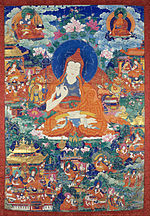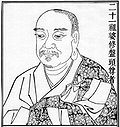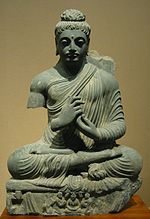 | Yogachara (redirect from Yogācāra Buddhism) Yogachara (Sanskrit: योगाचार, IAST: Yogācāra) is an influential tradition of Buddhist philosophy and psychology emphasizing the study of cognition, perception... 149 KB (18,225 words) - 02:06, 13 April 2024 |
 | Zhang Binglin (section Yogacara and Zhang) Practicers/proponents of Yogacara stress attention to the issues of cognition, consciousness, perception, and epistemology. Yogacara Buddhism is based on... 24 KB (3,166 words) - 07:37, 9 February 2024 |
 | Buddhist philosophy (section Yogācāra) Dan (2018). What is and isn't Yogacara. Lusthaus, Dan, What is and isn't Yogacara, http://www.acmuller.net/yogacara/articles/intro.html Lusthaus, Dan... 144 KB (18,576 words) - 21:06, 19 April 2024 |
Eight Consciousnesses (category Yogacara) aṣṭa vijñānakāyāḥ) is a classification developed in the tradition of the Yogācāra school of Mahayana Buddhism. They enumerate the five sense consciousnesses... 51 KB (5,421 words) - 08:30, 16 December 2023 |
 | Śāntarakṣita (redirect from Yogacara-Madhyamaka synthesis) Yogācāra and the logico-epistemology of Dharmakirti into a novel Madhyamaka philosophical system. This philosophical approach is known as Yogācāra-Mādhyamika... 28 KB (3,374 words) - 00:34, 11 April 2024 |
system first appears in the Saṃdhinirmocana Sūtra and in the works of the Yogācāra school. This classification system later became prevalent in various modified... 25 KB (2,886 words) - 15:28, 3 April 2024 |
Idealism is also found in some streams of Mahayana Buddhism, such as in the Yogācāra school, which argued for a "mind-only" (cittamatra) philosophy on an analysis... 115 KB (14,922 words) - 07:49, 25 April 2024 |
Nondualism (section Yogācāra tradition) postulating an underlying "basis of unity", both in the Buddhist Madhyamaka and Yogacara schools, and in Advaita Vedanta, collapsing phenomenal reality into a "single... 176 KB (21,463 words) - 13:06, 15 April 2024 |
 | Vasubandhu (category Yogacara scholars) his half-brother, Asanga, he was also one of the main founders of the Yogacara school. Vasubandhu's Abhidharmakośakārikā ("Commentary on the Treasury... 30 KB (3,484 words) - 21:58, 16 February 2024 |
 | Buddha-nature (section Yogācāra school) equated with emptiness; with the alayavijñana ("storehouse-consciousness", a yogacara concept); and with the interpenetration of all dharmas (in East Asian traditions... 109 KB (13,442 words) - 14:47, 21 April 2024 |
 | Madhyamaka (section Yogācāra-madhyamaka) to exist in the first place. Candrakīrti also criticized the Buddhist yogācāra school, which he saw as positing a form of subjective idealism due to their... 141 KB (17,675 words) - 03:28, 4 February 2024 |
 | Asanga (category Yogacara scholars) 112 verses that are a key work in Yogācāra philosophy. D'amato also places this text in the second phase of Yogacara scholarship, i.e. after the Bodhisattvabhumi... 18 KB (2,202 words) - 04:15, 2 March 2024 |
Middle Way (section Yogācāra) The Yogācāra school examines emptiness through its central teaching of the three basic modes of existence or "three natures" (svabhāva). In Yogācāra, the... 39 KB (5,289 words) - 15:27, 10 April 2024 |
 | Śūnyatā (section Yogācāra school) assertions and need not construct formal arguments. The central text of the Yogācāra school, the Saṃdhinirmocana-sūtra, explains emptiness in terms of the three... 85 KB (10,195 words) - 19:59, 24 April 2024 |
of Temple University's Department of Religion, and is a specialist in Yogācāra. The author of several articles and books on the topic, Lusthaus has taught... 4 KB (459 words) - 06:21, 3 October 2023 |
Sthiramati was a student of a Yogācāra scholar named Gunamati, and he was also a contemporary of another 6th century Yogācāra scholar, Dharmapala of Nālandā... 10 KB (1,256 words) - 22:42, 28 February 2024 |
Rangtong and shentong (redirect from Yogacara-Madyamaka) Indian and Tibetan doctrinal discussions on the topics of Madhyamaka, Yogacara, and the theory of Buddha-nature. Shentong adherents generally trace the... 49 KB (6,091 words) - 11:24, 23 April 2024 |
Nimitta (section In Yogacara) based on past karma or believed to foretell the dying's future destiny. In Yogacara philosophy, nimitta refers to the delusion that signs apprehended by the... 4 KB (406 words) - 23:06, 22 February 2024 |
texts attributed to the 5th-century Buddhist philosopher Vasubandhu of the Yogācāra school similarly discuss anātman as a fundamental premise of the Buddha... 85 KB (9,107 words) - 17:35, 20 April 2024 |
comprehensive commentary on Vasubandhu's seminal Yogacara work Triṃśikā-vijñaptimātratā Yogacara, or Wei Shi in Chinese, a school of Buddhist philosophy... 390 bytes (82 words) - 16:12, 25 March 2024 |
Cheng Weishi Lun (category Yogacara) Catalog number 1585), is a comprehensive treatise on the philosophy of Yogacara Buddhism and a commentary on Vasubandhu's seminal work, the Triṃśikā-vijñaptimātratā... 9 KB (1,145 words) - 21:53, 24 February 2024 |
 | Zen (category Yogacara) sutras, which were influential early meditation texts mostly based on the Yogacara (yoga praxis) teachings of the Kashmiri Sarvāstivāda circa 1st–4th centuries... 154 KB (17,358 words) - 23:09, 24 April 2024 |
 | Triṃśikā-vijñaptimātratā (category Yogacara) became one of the core texts for the Yogācāra school of Mahāyāna Buddhism. In it he touches on foundational Yogācāra concepts such as the storehouse consciousness... 4 KB (511 words) - 21:18, 2 April 2024 |
 | Chandrakirti (section Critiques of Yogācāra) he is said to have become an abbot. He is also said to have debated the yogācāra philosopher Chandragomin. According to Karen Lang: According to Bus ton... 38 KB (4,680 words) - 08:24, 12 April 2024 |






